|
by Dawn
Brazell
Public Relations
The name of the dog and the breed
differ from room to room, though
the stories of healing remain the
same.
As Wofford college sophomore
Natalie Hahn waits to get
discharged after six days in the
hospital, she chats with volunteer
Sally Jacob, Ph.D., and her pet
therapy dog, Buttercup. Hahn
absent-mindedly strokes
Buttercup's head and talks about
Hattie, her Boston terrier, who's
at home. When Hahn got her tumor
removed, both of her dogs knew.
They came over and rested their
heads over her incision.
"Hattie knew she couldn't be
rough with me," said Hahn, who
adds that she no longer makes any
plans, but takes life one day at a
time.
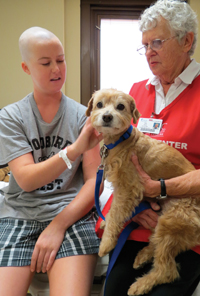 Patient Natalie
Hahn pets Buttercup, being held
by owner, Sally Jacob. Patient Natalie
Hahn pets Buttercup, being held
by owner, Sally Jacob.
Having therapy dogs in a hospital
is an awesome idea. When these
guys come around, it's like a
little taste of home."
In a room a couple of floors away,
James Bass feels the same. Having
just had a massive stroke, he
can't say much but he's perfectly
able to stroke Buttercup as the
family makes jokes about her Yoda
ears.
"I'm a rock star, too," he said,
as he allows a photo to be taken
of him and Buttercup. His
daughter, Vicky Bass Coker, who
insisted on the visit, gets tears
in her eyes. She tells the story
of how his dog stayed with him
after his stroke when he was home
alone and how the faithful pet
refused to leave his side. A
nurturing sort, she asks Jacob to
take Buttercup down the hallway to
visit a young patient who has a
broken neck from an accident.
"I just love seeing the smiles on
the patients' faces. It's like a
light bulb that goes off. It's a
glimpse of hope and happiness.
It's a connection."
It's a healing connection for
many patients, staff, employees
and the dog handlers who volunteer
the two to three hours a week to
bring in their dogs.
Charlie's
whole body wags when he makes
his visits. 
MUSC has two pet therapy
programs, one in adult volunteer
services and the other in the
Children's Hospital. Both report
high patient satisfaction and a
desire to grow the programs so
that patients and staff can have
more access to the services.
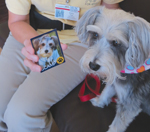 Children receive
cards from the dogs who visit
them. Children receive
cards from the dogs who visit
them.
Jacob, who is a retired
psychologist, started volunteering
in November. "She sat for her
badge, and I sat for mine," she
said of the identification badges
they both wear to be able to make
the rounds in the hospital.
"I like that it's something we
can do together. As soon as she
puts on this collar, she knows
it's a work day."
Jacob said she remembers one
patient who looked as if every
bone in her body was broken. "She
started crying when she saw her.
Buttercup kissed her. When she saw
her later, she told her
'Buttercup, you came when I needed
you most and you kissed me.' It
seems hard to believe that
something this small would make
such a difference, but it does."
Volunteer Jane Farkas agrees. She
tours around with Sophie, a
Portuguese water dog, at Ashley
River Tower, where the employees
know the pair. The retired nurse
said Sophie loves getting pets for
two hours. "Who wouldn't like
that? You can see the patients'
blood pressure lower on the
monitors as they pet the dog. It
is just so great to see people
smile and laugh. Patients like it.
Sophie loves it."
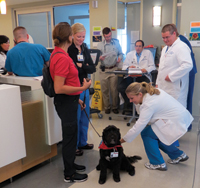 Jane Farkas tours
Ashley River Tower with Sophie. Jane Farkas tours
Ashley River Tower with Sophie.
Farkas said she's seen patients
respond to the dogs when they
haven't responded to anything
else. Sophie knows when people
aren't feeling well or when they
are in a bad mood. She recalls a
young depressed patient who
refused to talk to anyone. She
brought Sophie in to see if it
would help. "It was the first time
she smiled or laughed."
Other handlers report the same.
Helen Schroer, R.N., who works
part time at MUSC, said she loves
volunteering. It helps her do her
job better. Her dog, Nutmeg, is a
mixed lab, a gentle soul with
warm, brown eyes. "She's just a
big lover. She's been a blessing
to me, and it's great to share her
with other people. This is such a
joy," she said of doing pet
therapy. "It's what I wish my
everyday job could be. It's great
to put smiles on people's faces. I
can just spend time with the
patients without worrying about a
time schedule. It gets their minds
off their illness or their surgery
coming up."
Nutmeg
greets employee Larry
Lighthall. 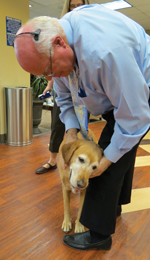
Schroer said she hopes more MUSC
employees and staff will become
involved with the program. It
helps her to be more in touch with
ways to make connections with
patients and avoid getting too
caught up in the bureaucracy and
busyness of the job. She said she
loves how it helps the nursing
staff as well.
Katy Kuder, manager of volunteer
and guest services, said she sees
how much impact pet therapy has on
patients and employees and wants
to expand the program. She plans
to get cards printed, similar to
what the handlers give out in the
Children's Hospital, and has set
up a way people can virtually
adopt a dog online with proceeds
funding the cards.
She also wants staff as well as
patients to be able to request
visits with the dogs. "It calms
staff if they're having a very
stressful day. The staff come
running every time there is dog on
the floor. It's a really good
thing for them. Everyone needs a
little therapy every now and
then."
The dogs have extensive training
and have to be registered to be in
the pet therapy program. They have
six dogs with a wide range of
sizes and breeds. Dog request
forms are on every clinical unit
and should be faxed to her office
by 9 a.m.
"We are the ones who assist the
staff in doing those things that
make us a hospital of choice. Our
volunteers are trained to go out
and be focused on that we want to
be recommended as a hospital.
Everything you do and every one of
your encounters needs to be geared
toward that complete satisfaction
that not only did we meet their
expectations, but that we far
exceeded them."
Kuder said they always are
looking for new volunteers, who
are asked to give 100 hours in a
calendar year, and dogs who have
good temperaments and enjoy being
around people. "I would love to
have the most elite pet therapy
program we can have. Our pet
therapy lends to a better patient
experience."
Emily Wallace, program specialist
with the Children's Hospital
Volunteer Services, said children
respond well to pet therapy. Many
children have always wanted a dog,
but their parents haven't allowed
it, so it's a treat. They have
three dog parades a year that
always are hits. They have 12
teams who serve the Children's
Hospital, nine on a regular
schedule. There are seven teams
that go to the Institute of
Psychiatry, six to the STAR
(Stabilization, Treatment,
Assesssment, Reintegration) Ladson
program and one to Rutledge Tower.
Wallace, who recently became a
volunteer herself, said they would
love to have dogs there seven days
a week, multiple times daily if
they could. Sometimes medical
procedures keep children from
being able to visit with the dogs,
who do two-hour shifts and may be
gone by the time a child returns
from a procedure.
That's one reason volunteer
Sharon Field, a retired hospice
nurse, loves to go into the
atrium. It's a way she can visit
with many children at once and her
Schoodle, Scamp, can show off her
tricks. Scamp rolls around on the
floor making a little growling
noise. "That's what I call her
trash talking."
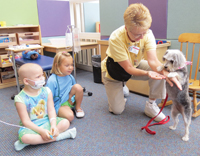 Patients enjoy
Scamp showing off her tricks
with her handler Sharon Field. Patients enjoy
Scamp showing off her tricks
with her handler Sharon Field.
Field gets her to settle down and
then take a bow and perform other
tricks. Patients Claire Conner and
Fallyn Hendrix smile as they watch
every move. "She's sassy, isn't
she?" Field asks, and they nod
vigorously.
Field knows that sassiness can
get children to do things, such as
physical therapy, that they
otherwise might not have the
motivation to perform. It also can
get responses out of children with
special needs whom therapists have
been unable to reach through
traditional means. She and Scamp
assess each case and see how they
best can help. She loves the
calming effects of the dogs on
children at STAR Ladson and the
Institute of Psychiatry.
Field said she'd recommend the
volunteer job to others. One
reason is that she enjoys spending
the time with Scamp.
But, it goes deeper than that.
"It's sort of like a mission for
me to bring some kind of support
and comfort to the families and
children here. I pray on the way
here that I can say the right
thing. I just love doing it.
Sometimes I think I get more out
of it than they do."
Want to
Volunteer?
For more information, to make a
donation or find out about
volunteering, contact Katy Kuder
in volunteer and guest services at
792-0858 or kuderk@musc.edu. For
information on the pet therapy
program in the Children's
Hospital, contact Emily Wallace in
volunteer and guest services at
792-8190 or walla@musc.edu.
|



 Patient Natalie
Hahn pets Buttercup, being held
by owner, Sally Jacob.
Patient Natalie
Hahn pets Buttercup, being held
by owner, Sally Jacob.
 Children receive
cards from the dogs who visit
them.
Children receive
cards from the dogs who visit
them. Jane Farkas tours
Ashley River Tower with Sophie.
Jane Farkas tours
Ashley River Tower with Sophie.
 Patients enjoy
Scamp showing off her tricks
with her handler Sharon Field.
Patients enjoy
Scamp showing off her tricks
with her handler Sharon Field.